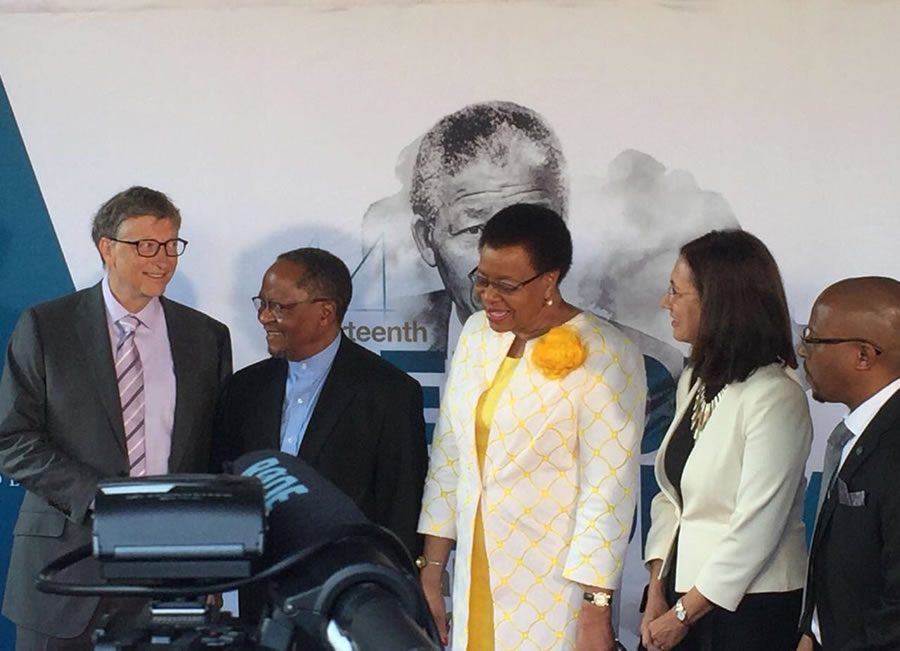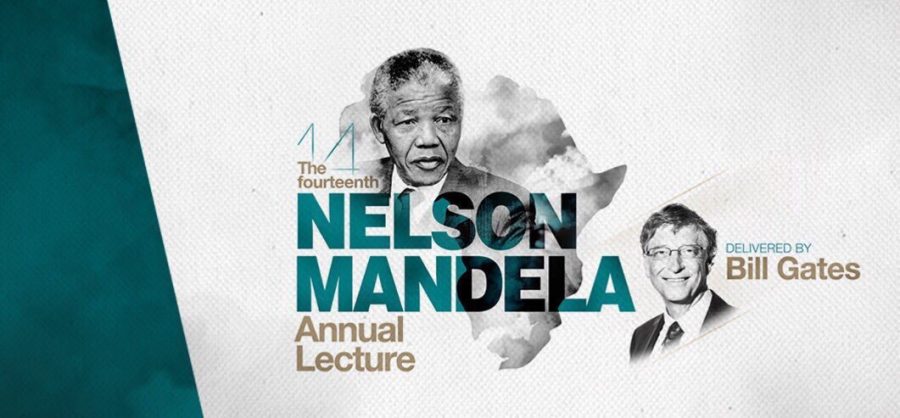
Key Points from Bill Gates’ 2016 Nelson Mandela Annual Lecture
PRETORIA – American philanthropist and Microsoft founder Bill Gates delivered the 2016 Nelson Mandela Annual Lecture at the University of Pretoria on Sunday. Gates spoke of how he first heard of Mandela at the age of nine, and first spoke to him in 1994 when Madiba called to ask the billionaire to help fund South Africa’s election. Gates said […]

PRETORIA – American philanthropist and Microsoft founder Bill Gates delivered the 2016 Nelson Mandela Annual Lecture at the University of Pretoria on Sunday.

Gates spoke of how he first heard of Mandela at the age of nine, and first spoke to him in 1994 when Madiba called to ask the billionaire to help fund South Africa’s election.
Gates said he and his wife Melinda had always known they would use their money for philanthropy, but it was their visits to Africa – seeing poverty that “disturbed us” and classrooms in Soweto that had no electrical power (for computers) – that made them realise that action was needed immediately.
Some of the key points of his lecture, under the theme ‘living together’, included:
- Every person – no matter where they live – should have the opportunity to lead a healthy and productive life.
PROGRESS AND CHALLENGES
- Nelson Mandela was concerned with the future. He believed people could make the future better than the past.
- Since 1990, child mortality in sub-Saharan Africa has been reduced by 54 percent. That translates to 1 million fewer children who died last year compared to 25 years ago.
- The incidence of poverty and malnutrition is down.
- In general, African countries tend to have higher rates of inequality than countries on other continents… Until progress belongs to all people, everywhere, the real promise of living together will remain elusive.
- In sub-Saharan Africa, 1 in 12 children will die before they turn 5. This is a vast improvement compared to 25 years ago, but African children are still 12 times more likely to die than the average child in a wealthy country.
- The continent’s two largest economies, here in South Africa and in Nigeria, are facing serious economic turmoil.
- Africa needs to do more, do it faster, and make sure everybody benefits. It won’t be easy, but I believe it can be done.
YOUTH
- Demographically, Africa is the world’s youngest continent, and its youth can be the source of a special dynamism.
- In the next 35 years, 2 billion babies will be born in Africa. By 2050, 40 percent of the world’s children will live on this continent.
- Young people are better than old people at driving innovation, because they are not locked in by the limits of the past.
- We must clear away the obstacles that are standing in young people’s way so they can seize all of their potential.
- If we make sure the basic needs of Africa’s young people [such as health and education] are taken care of… life on this continent will improve faster than it ever has.
HEALTH AND NUTRITION
- When people aren’t healthy, they can’t turn their attention to other priorities. But when health improves, life improves by every measure.
- Over the last 15 years, our foundation has invested more than $9 billion in Africa… In the next five years, we will invest another $5 billion.
- The entire continent of Africa has been polio-free for two years, which puts us within reach of wiping polio from the face of the earth… forever.
- It’s hard to imagine a better future for Africa’s youth without tackling [malnutrition].
EDUCATION
- With the high level of mobile phone penetration in Africa, technology using mobile phones connected to the Internet have the potential to help students build foundational skills while giving teachers better support and feedback.
- South Africa is blessed with some of the best universities in Africa… Maintaining the quality of this country’s higher education system while expanding access to more students will not be easy. But it is critical to South Africa’s future.
- One way to create economic opportunity is to turn agriculture, which still employs more than half the people on the continent, from a struggle for survival into a thriving business.
- Seven in 10 Africans currently lack access to power, which makes it harder to do everything.
- Unfortunately, a shortage of power – like South Africa is currently experiencing – is also a massive drag on economic growth. Businesses will not invest in places where they can’t operate efficiently.
- In the long run, what Africa needs is what the whole world needs: a breakthrough energy miracle that provides cheap, clean energy for everyone. I have spent much of the past two years on this issue because it’s hard to think of anything more important.
- I get angry when I see that Africa is suffering the worst effects of climate change although Africans had almost nothing to do with causing it.
GOVERNANCE
- It’s great to see initiatives like Mo Ibrahim’s annual index of African governance…
- Here in South Africa, the government gets strong marks for the budget information it provides to the public. The International Budget Partnership, an independent monitoring organization, also ranks South Africa highly for its oversight of government spending.
- One of the most exciting prospects is the role African governments can play in accelerating the use of digital technology to leapfrog the traditional models and costly infrastructure associated with banking and delivery of government services.
CONCLUSION
- Africa can achieve the future it aspires to.
- I meet with students all over the world, and they aren’t all so committed to giving back [to the community as young Africans are].
- Students here believe in themselves, and they believe in their countries and the future of the continent.
- The priority now is to make sure they have the opportunity to turn those beliefs into action. Because young people with this sense of purpose can make the difference between stagnation and more and faster progress.
- Our duty is not merely to arouse; our duty is to invest in young people, to put in place the basic building blocks so that they can build the future. And our duty is to do it now, because the innovations of tomorrow depend on the opportunities available to children today.
- Let’s do everything within our power right now to help them build the future that Nelson Mandela dreamed of – and the future that we will achieve together.
Read the full transcript of Gates’ speech here.
Gates will be speaking at the International AIDS conference in Durban in a few days time.
Bill Gates with Graça Machel, widow of former South African president Nelson Mandela #NMAL2016 pic.twitter.com/Gb5Pd9maN9
— SABC News (@SABCNews) July 17, 2016
Watch Video: Bill Gates delivers 14th Nelson Mandela Lecture
To watch Gates, start at approximately 37′.